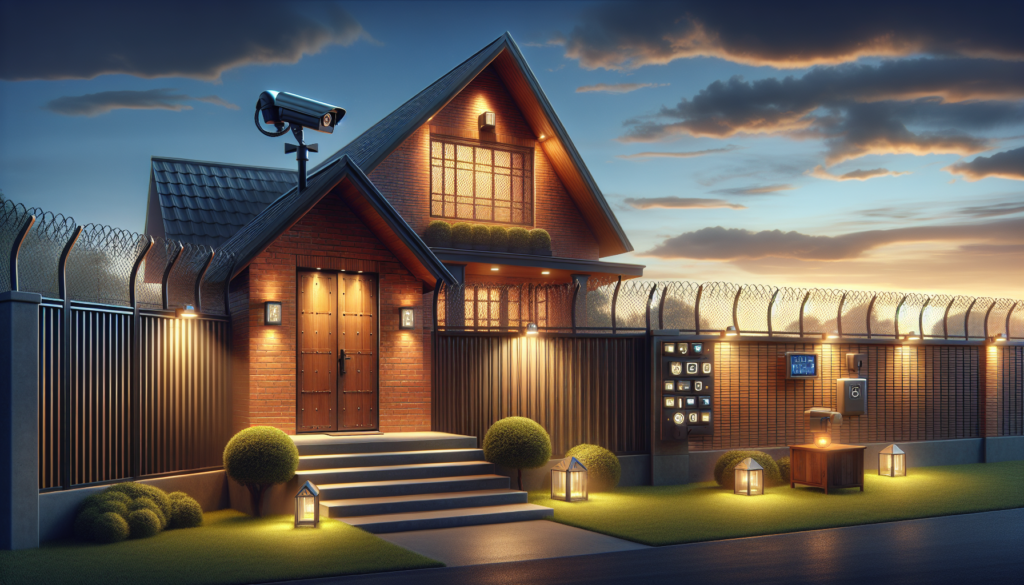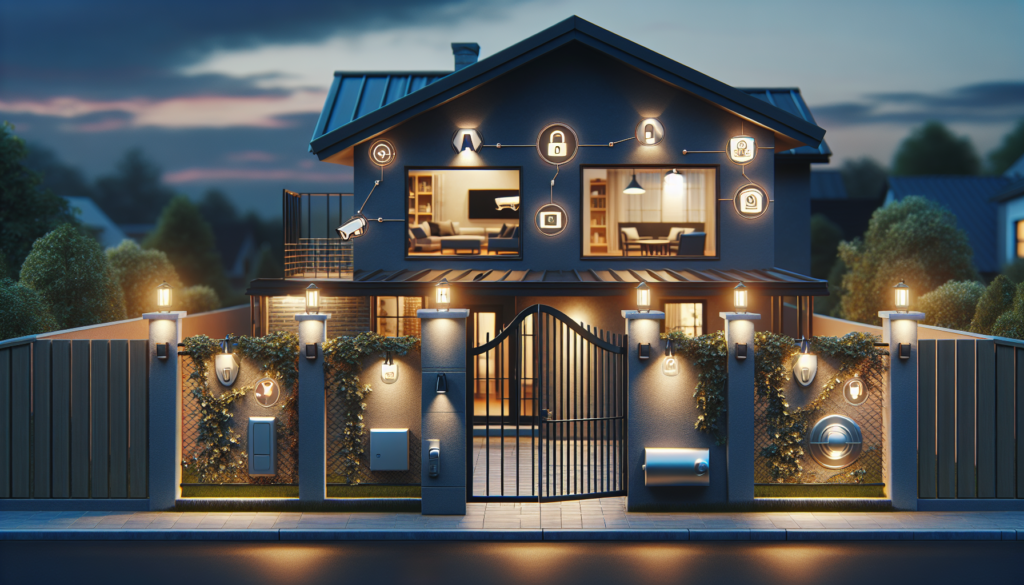Enhancing the security of your home is of utmost importance, and with the right fortification tips, you can create a safe and secure environment for you and your loved ones. This article provides valuable insights into fortifying your home, ensuring that you have all the necessary precautions in place. By implementing simple yet effective measures, such as reinforcing doors and windows, installing security systems, and improving outdoor lighting, you can significantly enhance the security of your home and gain peace of mind. With these tips at your disposal, you’ll be well-equipped to make your home a fortress of security.
Reinforcing Entry Points
When it comes to fortify your home, one of the first areas to focus on is reinforcing the entry points. Here are some measures you can take to enhance the security of your doors and windows:
Choosing solid doors
Investing in solid doors can act as a crucial barrier against potential intruders. Look for doors made from materials like solid wood, metal, or fiberglass. These materials are sturdy and provide an added layer of protection.
Installing deadbolt locks
A deadbolt lock is a simple yet effective security measure for your doors. Make sure to choose a deadbolt that extends at least one inch into the door jamb when fully locked. This will make it more difficult for someone to kick open your door.
Adding door and window sensors
Door and window sensors are essential in alerting you to any unauthorized entry attempts. These sensors are typically connected to a security system and will trigger an alarm if someone tries to open a door or window while the system is armed.
Securing sliding glass doors
Sliding glass doors are often seen as vulnerable entry points. Reinforce them by installing a metal or wooden bar in the track, preventing the door from sliding open when locked. This extra security measure can help deter potential intruders.
Using security screens or storm doors
Security screens or storm doors provide an additional layer of protection against forced entry. These screens are made from strong materials and are designed to withstand considerable impact. They also allow you to keep your main door open for ventilation while still maintaining security.
Strengthening Windows
Windows are another common point of entry for burglars. Strengthening your windows can significantly enhance the security of your home. Consider the following measures:
Installing window bars or grilles
Window bars or grilles act as a physical barrier, preventing unauthorized access through windows. They are particularly useful for windows in lower-level areas or those that are easily accessible from the ground.
Applying security film or laminates
Security film or laminates add a layer of protection to your windows, making them more resistant to breakage. These films are typically made from thick polyester and can make it more difficult for intruders to gain entry.
Upgrading to impact-resistant glass
Consider upgrading your windows to impact-resistant glass, also known as laminated glass. This type of glass is designed to withstand significant force and is less likely to shatter upon impact. It provides an extra level of protection against break-ins.
Using window locks and security pins
Window locks are a simple yet effective way to secure your windows. Make sure to install locks on all accessible windows and use security pins to prevent them from being forced open from the outside.
Installing window break sensors
Similar to door sensors, window break sensors are designed to detect the sound or vibration caused by a window being broken. These sensors can be integrated into your security system and provide an additional layer of detection for potential intrusions through windows.

Enhancing Exterior Lighting
Proper exterior lighting is crucial for deterring potential intruders. Here are some tips to enhance the lighting around your home:
Installing motion sensor lights
motion sensor lights are an excellent way to deter intruders as they illuminate the area when motion is detected. Install them near entryways, driveways, and other vulnerable areas around your home.
Using timer or sensor-activated lighting
Timer or sensor-activated lighting can help create the illusion that someone is home, even when you’re away. Set timers to turn on lights at specific times or use light sensors that automatically turn on outdoor lights when it gets dark.
Illuminating entryways, driveways, and pathways
Properly lighting the entryways, driveways, and pathways around your home improves visibility and reduces hiding spots for potential intruders. Illuminate these areas with bright lights to enhance security.
Employing smart lighting solutions
Consider using smart lighting solutions that allow you to control your outdoor lights remotely. With these systems, you can turn on or off the lights using your smartphone or set schedules to create the appearance of an occupied home.
Considering low-voltage landscape lighting
Low-voltage landscape lighting not only enhances the aesthetic appeal of your home but also improves overall security. Install these lights strategically to illuminate areas surrounding your home, such as bushes, trees, and fences.
Implementing a Secure Perimeter
Creating a secure perimeter around your property acts as a deterrent for potential intruders. Here’s how you can fortify the outside of your home:
Installing a sturdy fence or wall
A well-built fence or wall provides a physical barrier that can deter unauthorized access. Choose a sturdy material, such as brick, concrete, or metal, and ensure that the structure is difficult to climb or breach.
Adding secure gates or barriers
Secure gates with locks and barriers add an extra layer of security to your perimeter. Install gates that are resistant to forced entry and consider adding features like keypad access or remote control for convenience.
Using thorny plants for natural deterrents
Strategically planting thorny bushes or plants near windows, fences, and other vulnerable areas can act as a natural deterrent. These plants create an additional obstacle for potential intruders and make it harder for them to access your property.
Placing security cameras at key locations
Security cameras are an excellent deterrent and can help capture evidence in case of a security breach. Position cameras at key points around your property, such as entryways, driveways, and garages, to maximize coverage.
Installing driveway alarms
Driveway alarms notify you when a vehicle or person enters your driveway. These alarms can provide you with an early warning system, allowing you to take appropriate action if someone approaches your home.

Utilizing CCTV and Security Cameras
Closed-circuit television (CCTV) and security cameras play a vital role in enhancing the security of your home. Consider the following tips when implementing these systems:
Placing cameras at vulnerable areas
Identify vulnerable areas around your property, such as entryways, blind spots, and areas with valuable assets. Install cameras in these areas to ensure comprehensive coverage.
Ensuring wide coverage and good visibility
Position cameras in a way that provides a wide field of view and clear visibility. This will help capture critical details and provide better evidence in case of an incident.
Opting for weatherproof and vandal-resistant cameras
Outdoor security cameras should be weatherproof to withstand various environmental conditions. Additionally, consider using vandal-resistant cameras that are more durable and less susceptible to tampering.
Integrating cameras with a security system
Integrating your security cameras with a comprehensive security system allows for centralized monitoring and control. It also enables features such as remote viewing, recording, and alerts on your smartphone or computer.
Using remote monitoring capabilities
Take advantage of remote monitoring capabilities provided by many security camera systems. This allows you to check on your home in real-time, view recorded footage, and receive alerts when suspicious activity is detected.
Considering an Alarm System
An alarm system is a crucial component of any home security setup. Here are some factors to consider when choosing and implementing an alarm system:
Choosing a comprehensive security system
Look for a security system that includes features such as door and window sensors, motion detectors, glass break sensors, and a control panel. A comprehensive system provides maximum protection for your home.
Installing sensors on windows and doors
Ensure that all accessible windows and doors are equipped with sensors that detect unauthorized entry. This way, any attempt to breach your home will trigger the alarm system.
Including motion detectors and glass break sensors
Motion detectors and glass break sensors provide an additional layer of security for your home. These sensors can detect movement or the sound of glass breaking and trigger the alarm system accordingly.
Having a control panel and alarm monitoring
Invest in a control panel that allows you to arm and disarm the alarm system easily. Additionally, consider subscribing to a professional alarm monitoring service that can alert you and emergency responders in case of an alarm.
Enabling smartphone access and alerts
Many modern alarm systems offer smartphone access and alerts, allowing you to monitor your home remotely. This feature provides peace of mind and keeps you informed about the security of your home at all times.
Safeguarding Valuables
Protecting your valuables is an important aspect of home fortification. Consider the following measures to safeguard your prized possessions:
Investing in a fireproof safe
A fireproof safe is an essential item for protecting important documents, jewelry, and other valuable items. Choose a safe that offers both fire and burglary protection to ensure maximum security.
Securing jewelry and important documents
Keep your jewelry and important documents secure by storing them in a locked drawer or safe. Consider using a hidden safe or diversion safe that looks like an everyday object but conceals your valuables.
Using hidden and diversion safes
Hidden and diversion safes offer an extra layer of covert protection for your valuables. These safes are designed to look like everyday objects, such as books or household items, and can fool potential intruders.
Keeping backups of digital files
Create backups of your important digital files, such as family photos and important documents. Store these backups in a secure location, such as an external hard drive or cloud storage, to protect them from theft or damage.
Taking inventory for insurance purposes
Compile a detailed inventory of your valuable possessions for insurance purposes. Note down serial numbers, descriptions, and photographs of each item. This inventory will be invaluable in case of a theft or natural disaster.
Strengthening Home Automation
Home automation can play a significant role in enhancing the security of your home. Consider the following tips to fortify your home automation system:
Securing the Wi-Fi network
Ensure that your Wi-Fi network is secure to prevent unauthorized access to your home automation devices. Use a strong and unique password for your network and regularly update your router’s firmware.
Utilizing smart door locks and video doorbells
Smart door locks and video doorbells provide convenient and secure access to your home. Use smart locks that are resistant to hacking and video doorbells that allow you to see and communicate with visitors from anywhere.
Setting up smart smoke and carbon monoxide detectors
Smart smoke and carbon monoxide detectors provide enhanced safety for your home. These devices can send alerts to your phone when smoke or high levels of carbon monoxide are detected, allowing for prompt action.
Installing smart thermostats and lighting controls
Smart thermostats and lighting controls offer energy efficiency and convenience, but they can also enhance security. Use these devices to create the illusion of an occupied home even when you’re away.
Using remote access and monitoring apps
Take advantage of remote access and monitoring apps provided by your home automation system. These apps allow you to control and monitor various aspects of your home security from anywhere, providing peace of mind.
Implementing a Home Security Audit
Performing a home security audit can help you identify weak points and vulnerabilities in your home security measures. Here’s how you can conduct a thorough assessment:
Identifying weak points and vulnerabilities
Walk around your property and identify areas that could be potential entry points or hiding spots for intruders. This can include vulnerable windows, poorly lit areas, or easily accessible doors.
Assessing current security measures
Evaluate your existing security measures, including locks, alarms, and surveillance systems. Check for any potential flaws or areas of improvement that need addressing.
Addressing potential risks and improvements
Based on your evaluation, prioritize potential risks and make the necessary improvements. This could involve upgrading locks, adding additional security measures, or improving lighting in certain areas.
Creating an emergency plan and communication strategy
Develop an emergency plan that outlines what to do in case of a security breach or other emergencies. This should include communication strategies, such as a designated meeting point for family members.
Regularly reviewing and updating security measures
Security needs can change over time, so make it a habit to regularly review and update your security measures. Stay informed about new technologies and techniques to ensure your home remains secure.
Seeking Professional Security Services
If you want to take your home security to the next level, consider consulting with professionals and utilizing their expertise. Here are some services to consider:
Consulting with security experts
Security experts can provide valuable insights into fortifying your home. They can conduct a thorough assessment and recommend specific security measures tailored to your needs.
Hiring professional alarm system installation
Professional alarm system installation ensures that your security system is correctly set up and optimized for your home. This can help prevent any potential issues that could compromise the system’s effectiveness.
Contracting security patrol or monitoring services
Security patrol or monitoring services provide an added layer of protection for your home. These services often include regular patrols, alarm response, and 24/7 monitoring to ensure your property remains secure.
Considering neighborhood or community watch programs
Joining a neighborhood or community watch program can provide a sense of community and enhance overall security. These programs encourage residents to look out for each other and report any suspicious activity to the authorities.
Utilizing home security self-assessment tools
Many security companies and organizations offer self-assessment tools that can help you identify potential security weaknesses in your home. These tools provide a structured approach to evaluating your home’s security and suggest improvements.
By following these home fortification tips and implementing appropriate security measures, you can significantly enhance the safety of your home and protect what matters most to you. Remember to regularly review and update your security measures to stay ahead of potential threats. Stay safe!
